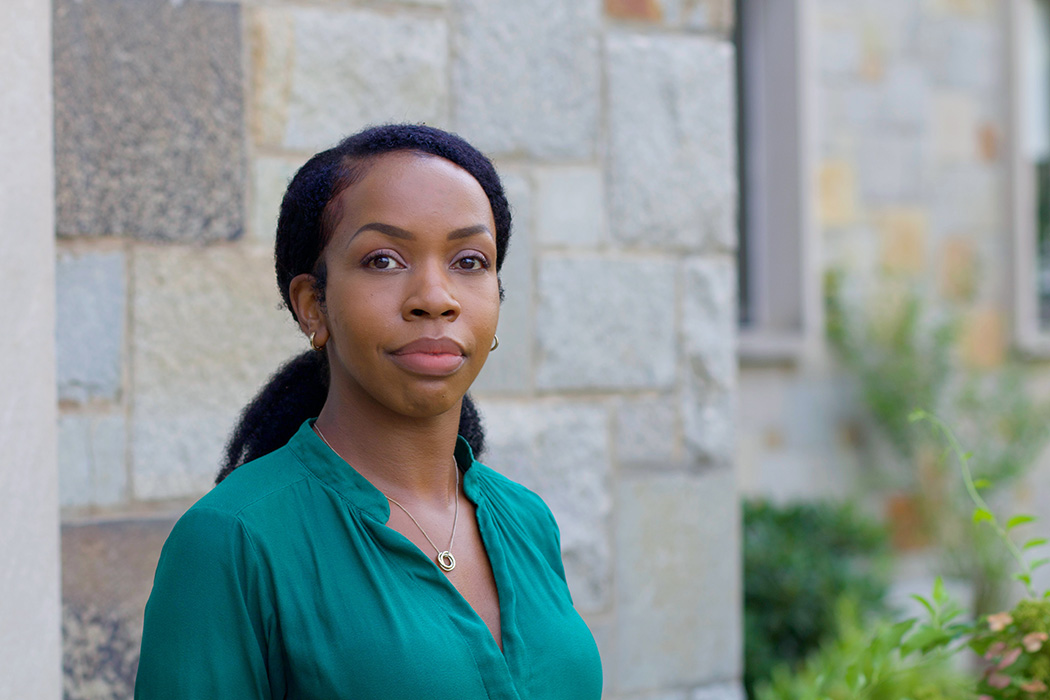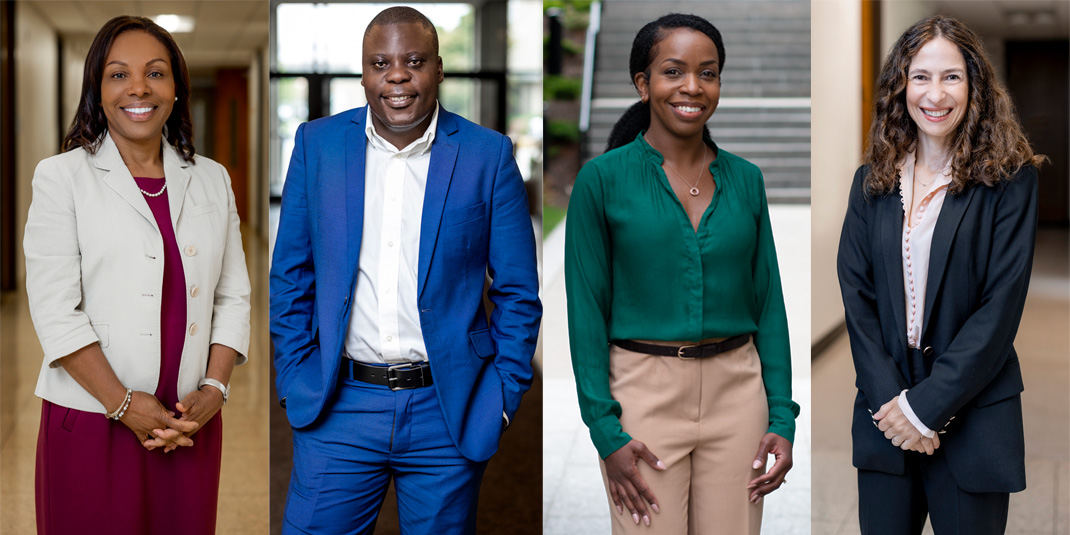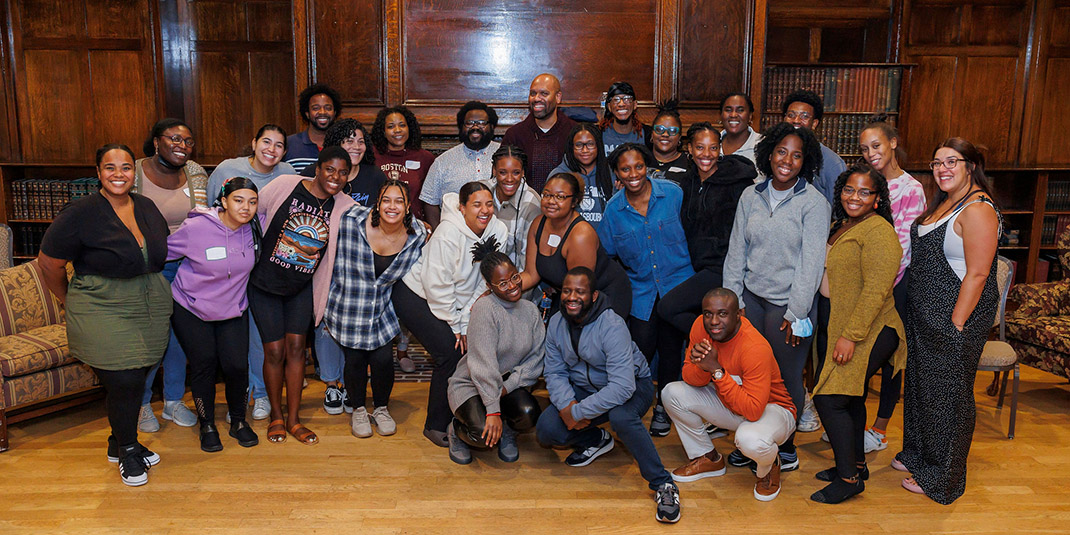
Whitney Irie says the Health Equitability Assessment and Readiness Tool will prioritize user experience. Photo by Taylor Morales.
Whitney Irie, an assistant professor in the Boston College School of Social Work, has received a five-year, $2.5 million grant from the National Institute of Allergy and Infectious Diseases to develop a research tool to assess the equitability of public health programs.
Irie says the Health Equitability Assessment and Readiness Tool—a questionnaire that will prioritize user experience—will help public health professionals pinpoint ways to improve programs that aim to increase opportunities for everyone to live healthy lives.
“My hope is that organizations use this tool to prove to funders that they should receive support for their programming,” says Irie, whose research situates health disparities as a consequence of social and structural practices driven by systems of oppression rather than individual behavior. “I really believe the tool could help kick start some structural change.”
She says she came up with the idea for the tool, whose acronym spells out HEART, following the murder of George Floyd and the emergence of the COVID-19 pandemic, which spurred funding organizations to invest more money in programs that aimed to promote health equity. As public health professionals started to create new programs with their new funding, she realized that there was no mechanism in place to measure their success.
“We assume that organizations have what it takes to deliver on their promise of creating equitable outcomes for the communities they serve, but there’s nothing in place right now to ensure that’s the case,” says Irie, whose primary research goal is to improve, promote, and protect the sexual and reproductive health of Black women in the U.S. “The HEART will empower these organizations to assess what it would take for them to improve the health and well-being of historically marginalized groups.”
Irie will develop the questionnaire using insight from doctors, patients, public health professionals, and other stakeholders, all of whom will respond to the same prompt: “What does it take to create a program that produces equity?”
“We’re hoping to sample a diverse range of public health service providers and beneficiaries in order to get conceptual insight into what they think it takes for a program to have an impact on health equity,” she says. “I would like for it to over-represent people who are not likely to be invited into these spaces because they are more than likely the ones who could benefit from the outcomes of a tool like this the most.”
Irie, who compares this part of the project to a “big group interview,” will categorize responses into different domains and create questions related to each area. She says one set of questions could focus on how closely employees reflect the demographics of the people they serve. Another set of questions might explore programs’ communication strategies, with an emphasis on the language they use to promote their services.
Public health organizations that complete the questionnaire will receive a score in each domain, helping them identify what they need to improve to make their programs more equitable.
“I think she has a big vision. And I think she’s also capable of taking that vision and turning it into very concrete, well crafted, detail-oriented, scientific proposals.”
Irie’s project is specifically funded by a Director’s Pioneer Award from the National Institutes of Health, a highly-selective honor that supports exceptionally creative scientists who are pursuing novel ideas outside their current research program. The award, established in 2004, supports outside-the-box thinkers pioneering new approaches to major challenges in biomedical, social science, and behavioral research.
Irie’s mentor, Elvin Geng, says her project takes a scientific approach to creating a more just and equitable society.
“Sometimes I think that scientists feel like they need to do stuff that’s sequestered from our politics and our passions, but science is the most impactful when it is aligned with wider societal conversations,” says Geng, professor of medicine and director of the Center for Dissemination and Implementation at Washington University in St. Louis. “I think as a field we can and should head in that direction. And I think this project is a great example of that.”
Irie plans to design the questionnaire with input from Larry Houston Ludlow, the former chair of the Department of Measurement, Evaluation, Statistics, and Assessment in the Lynch School of Education. While the look and feel of the questionnaire is to be determined, she says she wants to make it easy to use and fun—perhaps mobile friendly, drawing in participants with interesting vignettes and a colorful interface.
“A lot of innovations sit on the shelf because the people who created them don’t think about the user experience,” says Irie. “But the work means nothing if the people who could benefit from it don’t enjoy engaging in it.”
Irie hopes to pilot test the HEART with five public health organizations. She says that each organization will receive a $20,000 microgrant to support a program that aims to help end the HIV epidemic, with the stipulation that the organization use the tool at various stages of the program.
“We want to learn how the organizations used the tool, whether or not it made sense for them, and what their user experience was like,” says Irie.
After analyzing the questionnaire’s usability and feasibility, Irie plans to apply for more funding to expand the scope of the study. First she wants to create a toolkit with strategies packages to help public health organizations improve the equitability of their programs, then she wants to scrutinize the efficacy of the strategy packs to see which ones had the most positive impact.
“I want to push my research program forward,” says Irie. “I want to encourage and agitate systems a little bit in a meaningful way to improve engagement, increase education, and ultimately empower these organizations.”
Geng says Irie possesses the right mix of passion and scientific acumen to achieve her research goals. “I think she has a big vision,” he says. “And I think she’s also capable of taking that vision and turning it into very concrete, well crafted, detail-oriented, scientific proposals.”




